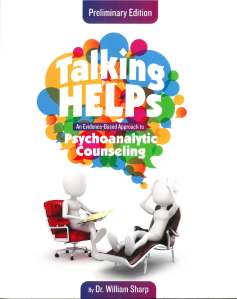By Dr. William Sharp
Psychoanalys is the talking cure and talking helps! Yet, we analysts are not always good at talking about our work so that those interested can learn some basics about it, especially if you compare all the textbooks and ‘how to’s’ out there for approaches like Dialectical Behavior Therapy (DBT) and Cognitive Behavior Therapy (CBT), that make their way into undergraduate and graduate classrooms.
I found that many of my students at Northeastern University and Wheelock College knew the basics of applied behavioral analysis, a manualized treatment with clear protocols, but loved to hear about psychodynamic cases and to get ideas from me on how to work with cases that other types of approaches were not successful with.
Ten years of presentations on the topic and two years of writing led to a preliminary copy of something teachers can use to introduce basic psychoanalytic concepts and their application in clinical settings, my new book Talking Helps: An Evidenced Based Approach to Psychoanalytic Counseling (2015, Cognella Publishing).
When I started writing this text, I realized it was a near impossible task. I suspect many will feel that such a textbook is not appropriate and will not catch the essence of psychoanalysis. And to them I say, please write others! I believe a proliferation in the area of accessible texts will only help the field. The more discussion we participate in, the better we will be able to define ourselves and strengthen psychoanalysis. I overcame my resistances on how to write this book by talking to people and realizing that it does not need to be perfect or contain everything. It can’t. Learning to be an analyst or psychoanalytically-informed counselor is largely experiential, but there are things I present here that can help start people thinking about their work in the helping professions by returning to its start in talk.
“Evidenced-based approaches” and “psychoanalysis” are terms that are not often put in the same sentence (let alone the title of a book!) Non-psychoanalytic approaches currently dominate journals and this can lead practitioners to succumbing to an availability or representativeness heuristic. Additionally, I have discovered people use the term research when they mean ‘nomothetic’ research, thereby completely negating the field of idiographic research, where much of psychoanalytic work lives.
The American Psychological Association statement pertaining to Evidenced-Based Practices in Psychology identifies “a number of competencies that promote positive therapeutic outcomes,” which I believe psychoanalytic research meets.
These competencies include assessments and case formulations, self-reflecting and acquiring new professional skills, and having cogent rationales for clinical strategies. Good psychoanalytic work does this. Consider, for example, the research model at BGSP. Analysts-to-be are required to be in personal analysis to study their own subjective counter transferences, a research supervision to help keep the study on task, and a clinical supervision to protect the interest of the patients and the clinical work.
My goal in writing this textbook was to help the reader understand the value of thinking deeply about cases and to begin to use the longstanding, tried and true (researched) techniques of psychoanalysis to understand what goes on in the patients’ emotional lives.
The text will not make you a “psychoanalyst.” Becoming a psychoanalyst requires experiential training in one of the many institutes found in most large cities. Rather, through case studies and self-reflective journals, and by introducing some practical how-to’s, the book intends to start you on a road to listening with an ear for the unconscious and becoming a psychodynamically informed or psychoanalytic counselor.
Psychoanalysis survives today as the oldest form of mental health treatment. Psychoanalysis works! Talking Helps!
To order a pre-release copy of the textbook (digitally or in paperback) email orders@cognella.com or call 800-200-3908 ext. 503.
Dr. William Sharp, Psya.D., is an Adjunct Faculty member at BGSP and author of the forthcoming book “Talking Helps: An Evidence-Based Approach to Psychoanalytic Counseling”. In addition to teaching at BGSP, he teaches at Northeastern University and Wheelock College, where he encourages psychoanalytic research and thinking. He currently has a private practice in Brookline Village for adults, children, and groups. You can follow him on Twitter @DrWilliamSharp.
